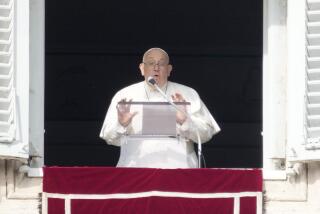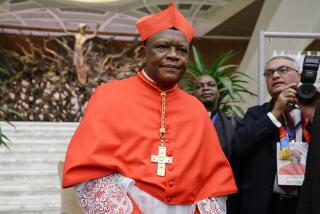A Lone Voice Is Heard as Bishops Skirt ‘Problem’
- Share via
NEW YORK — A Roman Catholic bishop addressed the issue of the church’s prohibition of contraception at a meeting in Washington of the church’s U.S. hierarchy. But his was a lone voice. The others at the meeting last week skirted the “problem.”
Most Catholics reject the church’s prohibition of contraception. This widespread dissent has been repeatedly documented and is widely recognized throughout the church.
But the bishops don’t talk about it, having been firmly called to heel about it by Pope John Paul II.
Nevertheless, Bishop Kenneth E. Untener, 53, of Saginaw, Mich., a warm, straightforward man standing at a microphone among about 300 of his fellow bishops, spoke up.
“When the people disagree,” he said, “it means something.”
“Some compare us to a dysfunctional family, which is unable to talk about its problem even though we all know about it.”
He urged attention to the sensus fidelium , or “sense of the faithful,” which, as long taught in the church, often brings fuller understanding of Christian truth through ordinary believers.
While the Holy Spirit acts through the “magisterium,” the bishops, to guide the church, the Spirit also acts through the people, Untener said, and their convictions should be taken seriously.
Noting that a document on sexuality that the bishops were considering advised those who dissent from the church’s stand against contraception to prayerfully reconsider, he said they might respond:
“We will if you will.”
It has become obvious that many lay people, many priests and even some bishops are not convinced that the ban on contraception is sound doctrine grounded in biblical principles, he said.
The bishops should “listen to what this is saying about Christian understanding of sexuality and what it means for the family in marriage,” he said, and added:.
“If we don’t, it can cause great damage to the church at large.”
Publicly, none of the bishops took him up on it, although several thanked him privately for his courage in mentioning the unmentionable. One did refer to it glancingly as something to be overcome.
“There may still be questions and a considerable amount of dissent” about contraception because “we have been reticent in asserting our position,” said Bishop James T. McHugh of Camden, N.J.
“We are trying to assert values and principles” and “inform the new generation what that position is,” he said of the sexuality document, which gently reiterated the ban and was approved.
Although not mentioning the particular “problem,” Auxiliary Bishop Austin B. Vaughan of New York wanted the entire sexuality document delayed to get response from parents, many of whom oppose its call for sex education.
He suggested that bishops aren’t exactly suited to deal with the subject.
“We’re all celibate,” he said. “None of us are parents. By U.S. standards we’re all aging. . . . We’re not experts. We’re a little out of touch with what’s going on. We should give interested parents a shot at this document.”
Mentioned or not, the contraception issue has simmered for years in the church, going back to the Second Vatican Council of 1962-65, which started to take up the matter before Pope Paul VI removed it from council consideration.
He put it before a papal commission of bishops, theologians and various experts. Eventually, a strong majority of them recommended modification of the contraception ban.
However, Pope Paul rejected that recommendation and in 1968 issued his controversial encyclical, “Humanae Vitae,” reasserting the prohibition and touching off waves of dissent among theologians and others.
Several foreign national hierarchies expressed reservations about the encyclical.
Surveys in this country have found that more than 80% of Catholics do not accept the teaching. Some scholars have contended that the encyclical has tended to undermine church teaching authority.
In 1980, Archbishop John R. Quinn of San Francisco told a synod of bishops in Rome that 70% of U.S. Catholics ignored the contraception ban and most priests supported that defiance of it.
His candor somewhat backfired. When some news reports implied he had criticized the church position, he quickly made clear that he firmly backed it.
Something of a further damper was put on the issue in 1987 when Pope John Paul met with a delegated group of bishops in Los Angeles.
Referring to dissent against the contraception ban, he said some claim this is “totally compatible with being a good Catholic and posed no obstacle to reception of the sacraments. This is a grave error.”
More to Read
Sign up for Essential California
The most important California stories and recommendations in your inbox every morning.
You may occasionally receive promotional content from the Los Angeles Times.













